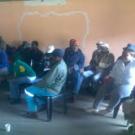Mapale Matsela (Lesotho), Tavatya Joseph Madzvamuse (Uganda), and Nana Lupyani (Zambia) have been working for the past two months on a project in Mpharane, in the Kingdom of Lesotho. 40% of the population live below the poverty line of US $1.25 a day. 1,800 members of four villages in Mpharane are facing poor harvests due to climate change related unpredictable start of rainy season, unusual dry periods, and extreme weather events/floods.
Climate change cuts across the whole spectrum of the society or community. It affects all facets of life as it has contributed to (a) food security deficits as well as household disposable income for the smallholder farmers in the area mentioned above. Lack of knowledge on alternatives such as adaptation technology has resulted in communities failing to tackle malnutrition among children.
Participatory Needs Assessment
|
|

|
Mapale facilitated a community needs assessment with community members, identify problems the community was facing and then developed the following solution oriented project outline.
The team developed this project outline to increase crop production, reduce malnutrition and improves livelihood alternatives.
|
|
Their simple project outline:
[Problem 1]. Poor harvests
Climate Smart Agricultural Practices Programme [solution to underlying cause: Climate Change: (unpredictable start of rainy season and unusual dry periods), and extreme weather events/floods have reduced crop harvests]:
[Activity 1]: Surveys and interviews to collect traditional knowledge on agriculture, changes in agricultural cycles, vulnerabilities and coping strategies
[Activity 2]: Identify expert specialist/extension agent in soil, water and agriculture to design and facilitate participatory workshops
[Activity 3]: Community workshop on participatory mapping of water and land resources and uses, agricultural challenges and vulnerabilities—and degraded hotspots
[Activity 4]: Extension agent visits most affected farmers to identify exact CC impacts to crop production and needs of farmers to adapt to the impacts (diseases, droughts and floods)
[Activity 5]: Develop plan that combines resilient and improved agricultural techniques with traditional knowledge for an overall improvement in productivity
[Activity 6]: Establish pilot plots demonstrating better cultivation practices
[Activity 7]: Conduct Farmer workshops on soil restoration and conservation techniques
[Activity 8]: Conduct Farmer workshops on water conservation and management techniques
[Activity 9]: Workshops on crop diversification and drought resistant crops.
[Problem 2] Chronic under-nutrition
Family garden and nutrition program [Solution to underlying causes; Lack of knowledge of nutrition and Home Gardens]
[Activity 1]: Conduct a food security, food diversity and home gardening survey
[Activity 2]: Workshop and follow-up in family nutrition and home garden planning for nutrition
[Activity 3]: Establish nutrition garden demonstration centers
Animal Husbandry Program [Solution to underlying causes: Chronic under-nutrition.]
[Activity 1]: Community-based workshop and survey with community members to identify their knowledge of animal husbandry.
[Activity 2]: A training program with a view to increase the training level of farmers in improving their know-how and skills in health, hygiene, nutrition, and proper care of livestock
[Activity 3]: Consultation with pastoral animal husbandry expert to develop a participatory process and training program
[Activity 4]: Periodic training sessions and 12 months of follow-up activities with pastoralists
|
What’s happening in the region where you live?
I look forward to hearing from you.
Sincerely,
Tim Magee, Executive Director
Would you like to
subscribe to this newsletter?
The Center for Sustainable Development specializes in providing sound, evidence-based information, tools and training for humanitarian development professionals worldwide. CSDi is a 501(c)(3) nonprofit organization.

